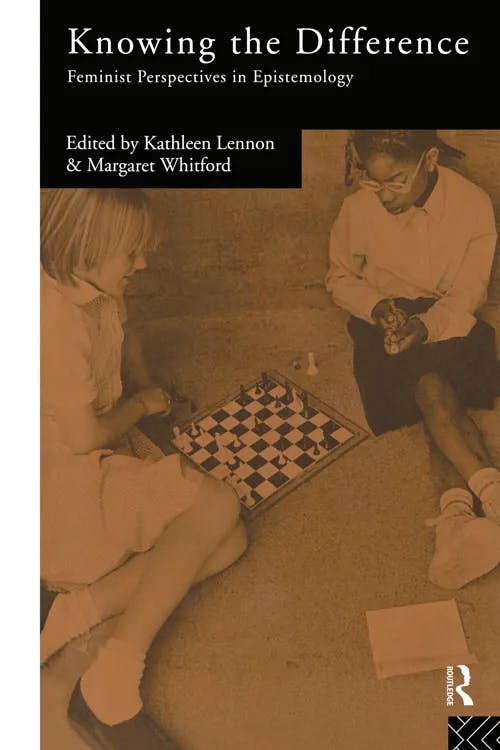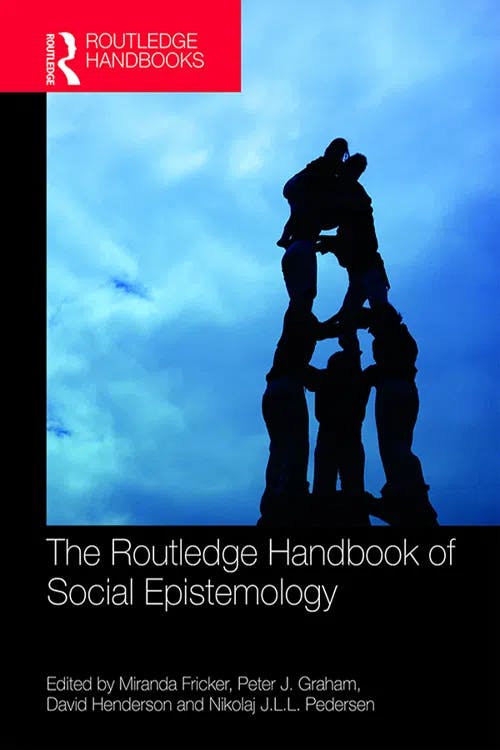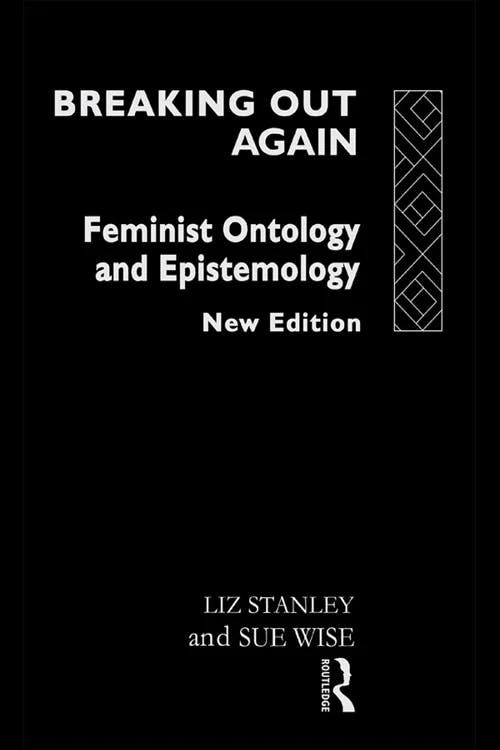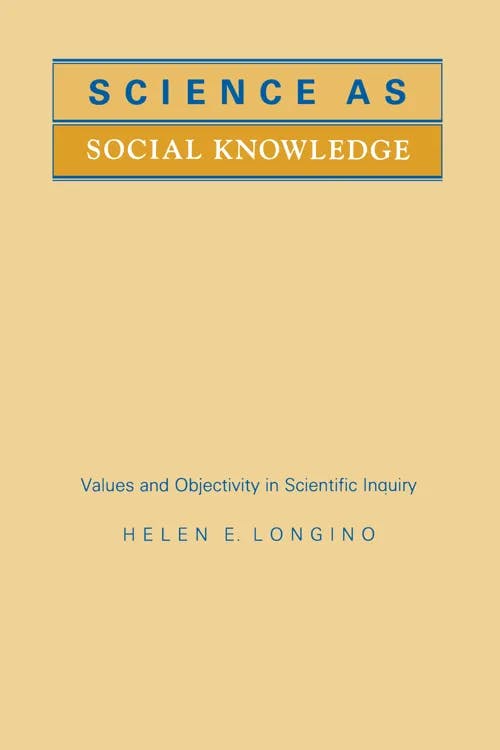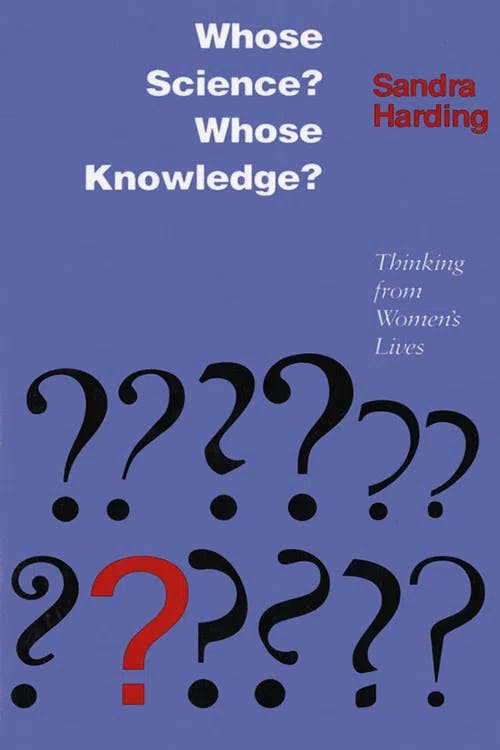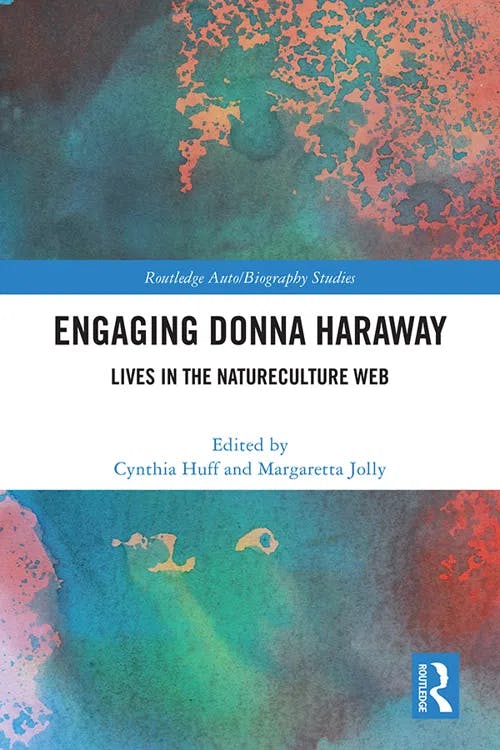What is Feminist Epistemology?
MA, Sociology (Freie Universität Berlin)
Date Published: 13.09.2023,
Last Updated: 09.01.2024
Share this article
Defining feminist epistemology
Feminist epistemology is a branch of philosophy that critically examines how knowledge is produced within patriarchal societies. As Kathleen Lennon and Margaret Whitford suggest in their book, Knowing the Difference, feminist epistemology does so by daring to question the uncritical reception of ideas we assume to be true:
Feminism’s most compelling epistemological insight lies in the connections it has made between knowledge and power. This, not simply in the obvious sense that access to knowledge enables empowerment; but more controversially through the recognition that legitimation of knowledge-claims is intimately tied to networks of domination and exclusion. This recognition has moved issues of epistemology from the world of somewhat esoteric philosophy to the centre-stage of contemporary culture. (2012)
Edited by Kathleen Lennon and Margaret Whitford
Feminism’s most compelling epistemological insight lies in the connections it has made between knowledge and power. This, not simply in the obvious sense that access to knowledge enables empowerment; but more controversially through the recognition that legitimation of knowledge-claims is intimately tied to networks of domination and exclusion. This recognition has moved issues of epistemology from the world of somewhat esoteric philosophy to the centre-stage of contemporary culture. (2012)
For feminist epistemologists, the role of patriarchal power in shaping the production of knowledge has radical implications for how we understand ourselves and the world around us. They specifically focus on the ways in which the experiences of men are unquestionably taken as universal, and how the exclusion of women’s perspectives in science and research has impacted widely held views around things like gender differences and more. As a discipline, feminist epistemology advocates for conducting science and research in ways that better account for the viewpoints and interests of women and other marginalized groups.
In this study guide, we will cover in more depth the philosophical lineages of feminist epistemology and review the specific points of contention that its proponents have with traditional forms of knowledge production. This is followed by an overview of the main perspectives on feminist epistemology put forth to remedy the issues identified with conventional epistemology, including feminist empiricism, standpoint theory, and feminist postmodernism. Finally, we will conclude with some of feminist epistemology’s legacies and influences in practice and in other forms of epistemic justice such as decoloniality.
Feminist epistemology: philosophical background
Traditional epistemology
Before addressing some of the major interventions associated with feminist epistemology as a school of thought, it’s useful to begin with an understanding of traditional epistemology, which is a subdiscipline of philosophy concerned with the question of how we know what we know. As Joel Bobbitt summarizes,
Epistemology is the branch of philosophy concerned with the nature and scope (limitations) of knowledge. It addresses the questions:
• What is knowledge?
• How is knowledge acquired?
• How do we know what we know?
Much of the debate in this field has focused on analyzing the nature of knowledge and how it relates to connected notions such as truth, belief, and justification. It also deals with the means of production of knowledge, as well as skepticism about different knowledge claims. (2014)
Joel Bobbitt
Epistemology is the branch of philosophy concerned with the nature and scope (limitations) of knowledge. It addresses the questions:
• What is knowledge?
• How is knowledge acquired?
• How do we know what we know?
Much of the debate in this field has focused on analyzing the nature of knowledge and how it relates to connected notions such as truth, belief, and justification. It also deals with the means of production of knowledge, as well as skepticism about different knowledge claims. (2014)
While these questions date back to the time of Greek philosophers such as Plato and Aristotle, much contemporary epistemology is associated with the works of seventeenth- and eighteenth-century Enlightenment philosophers such as Immanuel Kant, René Descartes, John Locke, David Hume, and Friedrich Hegel — all of whom were interested in the nature of knowledge and truth.
Epistemologists advocate for the use of rationalism, skepticism, and empiricism — i.e., reliance on observations — to arrive at conclusions about the world around us. Feminist epistemologists argue that in traditional epistemology, knowledge derived via these means is often understood to be universal, objective, and independent of the social relations within which the researchers are embedded. Questioning this universalizing tendency, feminist epistemologists crucially add a fourth question to Bobbitt’s above list: who gets to participate in the business of knowledge production?
Epistemic injustice
You may have noticed that all the philosophers associated with traditional epistemology mentioned above are white, European men. Feminist epistemologists believe that the social context within which knowledge is produced influences the kinds of interpretations we make and conclusions we draw when observing any given state of affairs — not to mention which kinds of questions we ask in the first place. Feminist epistemologists emphasize that, historically, knowledge production was conducted by men and, therefore, excluded the perspectives of women. This exclusion has culminated in what philosopher Miranda Fricker calls “epistemic injustice,” which has deep social and political implications. As Nancy Daukas writers in her chapter, “Epistemic Justice and Injustice,”
Miranda Fricker identifies the distinctively epistemic harms inflicted by the politics of knowing as epistemic injustices, and defines an epistemic injustice as “a wrong done to someone specifically in their capacity as a knower” […]. (2019)
Edited by Miranda Fricker, Peter J. Graham, David Henderson, and Nikolaj J.L.L. Pedersen
Miranda Fricker identifies the distinctively epistemic harms inflicted by the politics of knowing as epistemic injustices, and defines an epistemic injustice as “a wrong done to someone specifically in their capacity as a knower” […]. (2019)
Fricker identifies two types of epistemic injustice: testimonial and hermeneutical. Male-centric, traditional epistemology excludes and undermines women’s capacity to participate in knowledge production, as they are not taken seriously by dominant institutions. This culminates in testimonial injustice. Women are also denied the same opportunities as men to develop their own knowledge and understanding of the world around them, as they have been historically barred from equal educational opportunities — resulting in hermeneutic injustice.
In turn, because women are systematically excluded from the business of knowledge production, groups who hold power within patriarchal societies — namely, men — are often considered more objective. In feminist epistemological terms, this phenomenon of assumed objectivity is known as aperspectivity. Meanwhile, marginalized perspectives — such as those of women — are deemed subjective and often regarded with skepticism and even outright suspicion. Feminist epistemologists believe that finding ways to correct this tendency in knowledge production is an essential piece of creating a more egalitarian society, and holds just as much importance as other feminist issues like reproductive justice or pay equality.
Aims of feminist epistemology
Feminist epistemology intervenes to critically examine traditional methods and forms of knowledge production. It sheds light on how they reinforce or perpetuate gender-based biases and power structures. In Breaking Out Again, Liz Stanley and Sue Wise describe some of the main concerns feminist epistemologists raise in how knowledge is traditionally produced:
There are a number of key areas of the research process in which we think precepts drawn from feminist epistemology need to be integrated: in the researcher/researched relationship; in emotion as an aspect of the research process which, like any other aspect, can be analytically interrogated; in critically unpacking conceptualizations of ‘objectivity’ and ‘subjectivity’ as binaries or dichotomies; in the ‘intellectual autobiography’ of researchers, that is, in the processes by which ‘understanding’ and ‘conclusions’ are reached; in the existence and management of the different ‘realities’ or versions held by researchers and researched; and in issues surrounding authority and power in research, but also and perhaps more crucially in written representations of research. (2002)
Liz Stanley and Sue Wise
There are a number of key areas of the research process in which we think precepts drawn from feminist epistemology need to be integrated: in the researcher/researched relationship; in emotion as an aspect of the research process which, like any other aspect, can be analytically interrogated; in critically unpacking conceptualizations of ‘objectivity’ and ‘subjectivity’ as binaries or dichotomies; in the ‘intellectual autobiography’ of researchers, that is, in the processes by which ‘understanding’ and ‘conclusions’ are reached; in the existence and management of the different ‘realities’ or versions held by researchers and researched; and in issues surrounding authority and power in research, but also and perhaps more crucially in written representations of research. (2002)
In the following sections we cover the three main perspectives in feminist epistemology and the particularities of how they engage with these concerns.
Main perspectives of feminist epistemology
Feminist empiricism
One major branch of feminist epistemology is feminist empiricism. Feminist empiricists use empirical methods as a way of better unifying feminist concerns with scientific inquiry. They don’t necessarily take issue with the traditional methods associated with epistemology — i.e., experimentation, reason, and skepticism — but they see the exclusion of women’s concerns and perspectives as poorly conducted, biased science. Feminist empiricists, therefore, commonly critique methodologies of existing research that reinforce gender stereotypes.
For example, the well-known feminist empiricist Helen Longino revisited a study of artifacts used by hunter gatherers. She argues that the researchers’ interpretation of the objects unearthed are clouded by the gendered division of labor associated with their own contemporary socialization — instead of being accurately representative of the prehistoric peoples being studied. As Longino writes in her book, Science as Social Knowledge,
In the evolutionary studies the assumption of dimorphism [male-female binary] plays as much of a role as it does in the endocrinological studies: males and females are assigned distinctive roles that parallel contemporary Western stereotypes. In addition, in the evolutionary studies assigning central significance to man-the-hunter androcentric [male-centric] values are expressed directly in the framework within which the data are interpreted: chipped stones are unequivocal evidence of male hunting only in a framework that sees postulated male behavior as central not only to the evolution of the species but to the survival of any group of its members. (2020)
Helen E. Longino
In the evolutionary studies the assumption of dimorphism [male-female binary] plays as much of a role as it does in the endocrinological studies: males and females are assigned distinctive roles that parallel contemporary Western stereotypes. In addition, in the evolutionary studies assigning central significance to man-the-hunter androcentric [male-centric] values are expressed directly in the framework within which the data are interpreted: chipped stones are unequivocal evidence of male hunting only in a framework that sees postulated male behavior as central not only to the evolution of the species but to the survival of any group of its members. (2020)
Here, Longino’s point is that the male scientists’ social standpoints — particularly ones that reinforce patriarchal biases — influenced how they interpreted evidence, a central aspect of empirical study.
In turn, these conclusions serve to naturalize gendered traits in contemporary times — such as the idea that men belong in public life and women in the domestic sphere. Longino continues,
Evolutionary studies undertaken within the man-the-hunter framework have been taken to show that the sexual division of labor observable in some contemporary human societies has deep roots in the evolution of the species. The stories of males going off together to hunt large animals and females staying home and nurturing their young seems to some to prefigure contemporary, [...] Western middle-class social life: men engage in public affairs, management of production and governance, and women in domestic affairs, childrearing, house-keeping, and husband maintenance. (2020)
Feminist empiricists, therefore, seek to use empirical tools to reexamine scientific conclusions that we take for granted by looking at them outside of the dominant perspectives, which are influenced by male-centric biases.
Yet, one prevalent criticism of feminist empiricism is that the traditional tools of scientific inquiry are themselves insufficient to remedy epistemic injustices. Feminist epistemologists who take issue with feminist empiricism maintain that scientific institutions are too deeply shaped by patriarchy. They believe that the very questions we pursue when it comes to scientific inquiry ought to be reconsidered in line with the interests of women and other marginalized groups. This brings us to the next form of epistemology: standpoint theory.
Standpoint theory
Another key approach to feminist epistemology is that of standpoint theory, which starts by critically interrogating which points of inquiry get prioritized in the first place, and — importantly — who decides. Largely inspired by the Marxist assertion that capitalist society ought to be understood from the perspective of workers’ lives, standpoint theorists advocate for what feminist epistemologist Sandra Harding calls “sciences from below” by centering the interests of women and other marginalized groups.
Moreover, standpoint theorists such as Harding argue that these groups actually have epistemic privilege in informing scientific research because their perspectives can help fill in the blind spots of researchers who come from dominant identity groups. As Harding puts it,
The distinctive features of women’s situation in a gender-stratified society are being used as resources in the new feminist research. It is these distinctive resources, which are not used by conventional researchers, that enable feminism to produce empirically more accurate descriptions and theoretically richer explanations than does conventional research. Thus, the standpoint theorists offer an explanation different from that of feminist empiricists of how research directed by social values and political agendas can nevertheless produce empirically and theoretically preferable results. (2016)
Sandra Harding
The distinctive features of women’s situation in a gender-stratified society are being used as resources in the new feminist research. It is these distinctive resources, which are not used by conventional researchers, that enable feminism to produce empirically more accurate descriptions and theoretically richer explanations than does conventional research. Thus, the standpoint theorists offer an explanation different from that of feminist empiricists of how research directed by social values and political agendas can nevertheless produce empirically and theoretically preferable results. (2016)
For example, imagine a group of urban planners working on the design for a new quarter in a city. According to standpoint theory, including women in the design of a new quarter in the city would mean that they might take into account the safety concerns of women walking alone at night or to prioritize more family-friendly areas such as parks and playgrounds.
Standpoint theory also contends that those who control our knowledge-producing institutions should not simply be those with the most power — whether it be men or corporations or governments and militaries. Standpoint theorists argue that in our current social order these groups get to decide which questions are worth researching and which projects get funded. In line with this assertion, standpoint theory also takes an intersectional approach and is an important element of critical race theory. For example, in Black Feminist Thought, Patricia Hill Collins highlights the importance of elevating black women’s perspectives on the world in informing scientific inquiry.
Feminist postmodernism
Finally, as part of a broader critique of Enlightenment philosophy, feminist postmodernism takes issue with the pursuit of universal, objective forms of knowledge as a project itself. Rather, feminist postmodernists are more interested in the ways in which things like power, ideology, and identity shape social reality. For feminist postmodernists, there will always exist vastly different perspectives on social reality and, therefore, no one identity group can claim absolute, objective knowledge.
In terms of how this translates into feminist issues, feminist postmodernists reject binary conclusions about characteristics essential to men — such as strength and aggression — and to women — such as docility and domesticity. Instead, they emphasize the fragmented nature of identity by pointing to the various relationships to gender experienced by gender non-conforming people and people who live outside of white, western cultural contexts such as the Hijras in India or the two-spirit of indigenous peoples of North America.
Beyond merely challenging the gender binary (see our guide to gender performativity for more), postmodern feminists also tend to critique and break apart how we delineate our identities in the first place. One such postmodern feminist epistemologist is Donna Haraway, who is associated with new materialism and posthumanism, a perspective which goes beyond the previous two approaches to feminist epistemology by reimagining the bounds of categories such as man, woman, and even human. As Stephen Abblitt explains in “Composite Lives,”
The human, always already surpassing the merely human, only ever existed through our relations and interrelations with others—other humans, companion species, nonanimal life forms, and technical and technological artifacts. ‘To be a one at all,’ contends Haraway, ‘you must be a many, and that’s not a metaphor.’ We do not merely move in a field of embodied actions and experiential constructs but interact with and absorb the manifold substances of our habitat, our bodies in conversation with that habitat ‘perceptually, biochemically, and viscerally.’ We lack the solid, hard-drawn psychic and corporeal boundaries we imagine separate us from nonhuman species, nonanimal living matter, and our external environment—as compostists, we are porous, permeable, leaky and leaking. (2022)
Edited by Cynthia Huff and Margaretta Jolly
The human, always already surpassing the merely human, only ever existed through our relations and interrelations with others—other humans, companion species, nonanimal life forms, and technical and technological artifacts. ‘To be a one at all,’ contends Haraway, ‘you must be a many, and that’s not a metaphor.’ We do not merely move in a field of embodied actions and experiential constructs but interact with and absorb the manifold substances of our habitat, our bodies in conversation with that habitat ‘perceptually, biochemically, and viscerally.’ We lack the solid, hard-drawn psychic and corporeal boundaries we imagine separate us from nonhuman species, nonanimal living matter, and our external environment—as compostists, we are porous, permeable, leaky and leaking. (2022)
By transcending the restrictive categories that reinforce systems of power such as static gender binaries, postmodern feminists argue that we can arrive at new epistemologies, based on expanded conceptions of how we frame the self, our relations to others, and the world around us.
Closing thoughts
Feminist epistemology seeks to challenge the traditional notion that knowledge is universal and objective, rather than shaped by dynamics of power and the values of the society in which it is produced. It highlights how patriarchy, social context, and the different lived experiences of those who produce knowledge fundamentally influence epistemology. In order to remedy epistemic injustices resulting from the historic exclusion of women from institutions like academia, scientific research, and the private sector, feminist epistemologists advocate for ways of creating more inclusive epistemologies.
Feminist epistemologists argue that doing so will make the conclusions drawn from scientific inquiry more robust because they will be less skewed through unconscious, male-centric biases that occur when researchers do not examine their subjective perspectives and proximity to power. The influence of feminist epistemology is significant, as it has promoted the recognition of marginalized perspectives; a more rigorous approach to empiricism; diversity of curricula to include the contributions of women; and more thoughtful conceptions of rationalism and objectivity. Moreover, incorporating feminist values such as empathy, ecology, and the importance of relationships not only results in a more egalitarian and socially aware epistemology but extends to reshape cultural values and institutions more broadly.
Further reading on Perlego
- For more information, you can read our guide on epistemology.
- Epistemology: A Contemporary Introduction to the Theory of Knowledge (2010) by Robert Audi.
- Ethics of Care: Critical Advances in International Perspective (2015) edited by Marian Barnes, Tula Brannelly, Lizzie Ward, and Nicki Ward.
- Simians, Cyborgs, and Women: The Reinvention of Nature (2013) by Donna Haraway.
- Feminist Theory Reader: Local and Global Perspectives (2020) edited by Carole R. McCann, Seung-kyung Kim, and Emek Ergun.
- Objectivity, Perspectivity and Difference: Issues in Feminist Epistemology (2014) by Susan Strickland.
What is feminist epistemology in simple terms?
What is epistemic injustice?
What is an example of feminist epistemology?
Who are scholars associated with feminist epistemology?
Bibliography
Bobbitt, Joel. (2014) Epistemology. Learning Press. Available at: https://www.perlego.com/book/1239014/epistemology-significant-branch-of-philosophy-concepts-and-theories-pdf
Collins, P.H. (2002) Black Feminist Thought: Knowledge, Consciousness, and the Politics of Empowerment. 2nd edn. Routledge. Available at: https://www.perlego.com/book/1610042/black-feminist-thought-knowledge-consciousness-and-the-politics-of-empowerment-pdf
Fricker, M., Graham, P.J., Henderson, D., and Pedersen, N.J.L.L. (eds.) (2019) The Routledge Handbook of Social Epistemology. Routledge. Available at: https://www.perlego.com/book/1561668/the-routledge-handbook-of-social-epistemology-pdf
Harding, S. (2016) Whose Science? Whose Knowledge?: Thinking from Women’s Lives Cornell University Press. Available at: https://www.perlego.com/book/534735/whose-science-whose-knowledge-thinking-from-womens-lives-pdf
Huff, C., and Jolly, M. (eds.) (2022) Engaging Donna Haraway: Lives in the NatureCulture Web. Routledge. Available at: https://www.perlego.com/book/3528339/engaging-donna-haraway-lives-in-the-natureculture-web-pdf
Lennon, K. and Whitford, M. (eds.) (2012) Knowing the Difference: Feminist Perspectives in Epistemology. Routledge. Available at: https://www.perlego.com/book/1620262/knowing-the-difference-feminist-perspectives-in-epistemology-pdf
Longino, H.E. (2020) Science as Social Knowledge. Princeton University Press. Available at: https://www.perlego.com/book/1377391/science-as-social-knowledge-values-and-objectivity-in-scientific-inquiry-pdf
Stanley, L. and Wise, S. (2002) Breaking Out Again: Feminist Ontology and Epistemology. Routledge. Available at: https://www.perlego.com/book/1620684/breaking-out-again-feminist-ontology-and-epistemology-pdf
MA, Sociology (Freie Universität Berlin)
Lily Cichanowicz has a master's degree in Sociology from Freie Universität Berlin and a dual bachelor's degree from Cornell University in Sociology and International Development. Her research interests include political economy, labor, and social movements. Her master's thesis focused on the labor shortages in the food service industry following the Covid-19 pandemic.

